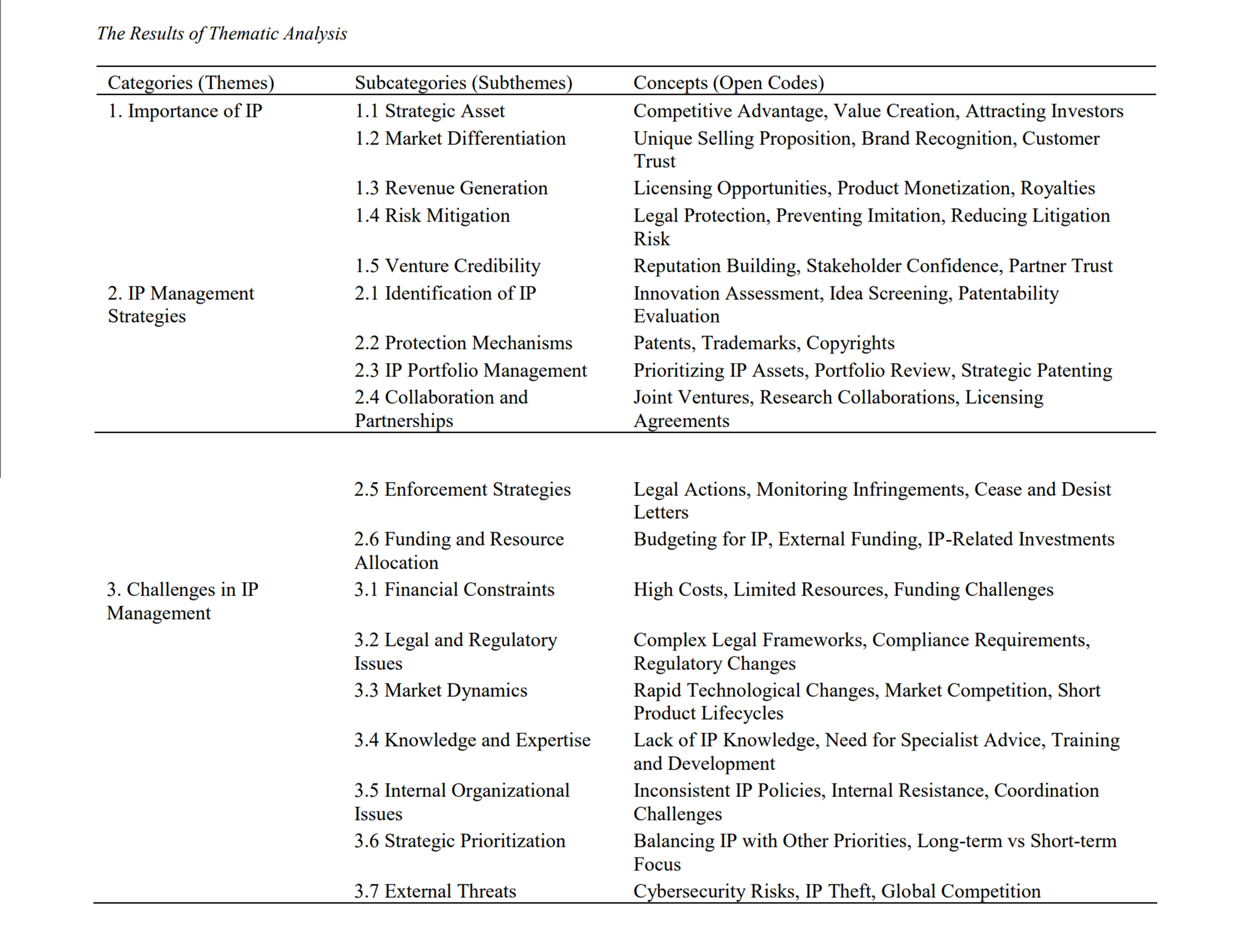Intellectual Property Management in Early-Stage Technology Ventures: A Qualitative Study
کلمات کلیدی:
ntellectual Property Management, Early-Stage Technology Ventures, Innovation, Competitive Advantage, IP Strategiesچکیده
The objective of this study was to explore the strategies and challenges associated with intellectual property (IP) management in early-stage technology ventures. By examining how these ventures navigate the complexities of IP, the study aims to provide insights into the practices that contribute to their innovation, competitive advantage, and long-term sustainability. This qualitative study employed semi-structured interviews with 27 participants who were actively involved in managing IP within early-stage technology ventures. Participants were selected through purposive sampling to ensure relevant experience in IP management. Data were collected until theoretical saturation was achieved. The interviews were transcribed and analyzed using NVivo software, following a thematic analysis approach to identify key themes and subthemes. The analysis revealed three main themes: the importance of IP, IP management strategies, and challenges in IP management. Participants highlighted the strategic role of IP in providing a competitive edge, attracting investment, and facilitating market differentiation. Key strategies identified included systematic identification and protection of IP, collaboration and partnerships, and enforcement mechanisms. Challenges encompassed financial constraints, legal and regulatory complexities, lack of IP knowledge, internal organizational issues, and external threats such as cybersecurity risks and global competition. These findings align with existing literature on IP management and underscore the multifaceted nature of IP in early-stage ventures. Effective IP management is crucial for the success of early-stage technology ventures. The study emphasizes the need for robust IP strategies, education and expertise in IP, strategic collaborations, and vigilant enforcement mechanisms. Addressing financial and regulatory challenges and investing in cybersecurity are essential for mitigating risks and sustaining competitive advantage. The insights gained can inform entrepreneurs, investors, and policymakers in developing practices and policies that support innovation and growth in the technology sector.
دانلودها
مراجع
Ackerly, D. C., Valverde, A. M., Diener, L. W., & Dossary, K. L. (2008). Fueling Innovation in Medical Devices (And Beyond): Venture Capital in Health Care. Health Affairs, 27(Suppl1), w68-w75.https://doi.org/10.1377/hlthaff.28.1.w68
Arora, A., Fosfuri, A., & Gambardella, A. (2001). Markets for Technology and Their Implications for Corporate Strategy. Industrial and Corporate Change, 10(2), 419-451. https://doi.org/10.1093/icc/10.2.419
Aslam, W., Lee, H. J., & Lamb, C. (2020). Standardizing Education in Interventional Pulmonology in the Midst of Technological Change. Journal of Thoracic Disease, 12(6), 3331-3340. https://doi.org/10.21037/jtd.2020.03.104
Bhaduri, A. (2023). Communities as Inventors: Rethinking Positive Protection of Traditional Knowledge Through Patents. The Journal of World Intellectual Property. https://doi.org/10.1111/jwip.12279
Cavalheiro, G. M. d. C., Cavalheiro, M. B., & Mariano, S. R. H. (2020). A Patent-Based Model of Entrepreneurship Education in Brazil. Education + Training, 62(7/8), 947-963. https://doi.org/10.1108/et-07-2019-0164
Deeds, D., Mang, P. Y., & Frandsen, M. L. (2004). The Influence of Firms’ and Industries’ Legitimacy on the Flow of Capital Into High-Technology Ventures. Strategic Organization, 2(1), 9-34.https://doi.org/10.1177/1476127004040913
Evertsen, P. H. (2023). Resource Configurations Among Digital Academic Spin-Offs: Finding the Technology-Market Fit. International Journal of Entrepreneurial Behaviour & Research, 30(2/3), 520-547. https://doi.org/10.1108/ijebr10-2022-0937
KarataŞ, M. H., & ÇAkir, H. (2023). A Systematic Literature Review on IT Governance Mechanisms and Frameworks. Journal of Learning and Teaching in Digital Age. https://doi.org/10.53850/joltida.1300262
Kirchberger, M., & Pohl, L. (2016). Technology Commercialization: A Literature Review of Success Factors and Antecedents Across Different Contexts. The Journal of Technology Transfer, 41(5), 1077-1112.https://doi.org/10.1007/s10961-016-9486-3
Lahiri, A., Pahnke, E. C., Howard, M., & Boeker, W. (2019). Collaboration and Informal Hierarchy in Innovation Teams:Product Introductions in Entrepreneurial Ventures. Strategic Entrepreneurship Journal, 13(3), 326-358.https://doi.org/10.1002/sej.1331
Manchester, C. F., Benson, A., & Shaver, J. M. (2023). Dual Careers and the Willingness to Consider Employment in Startup Ventures. Strategic management journal, 44(9), 2175-2194. https://doi.org/10.1002/smj.3481
Minin, A. D., & Faems, D. (2013). Building Appropriation Advantage: An Introduction to the Special Issue on Intellectual Property Management. California Management Review, 55(4), 7-14.https://doi.org/10.1525/cmr.2013.55.4.7
Motari, M. (2021). The Role of Intellectual Property Rights on Access to Medicines in the WHO African Region: 25 years After the TRIPS Agreement. BMC public health. https://doi.org/10.1186/s12889-021-10374-y
Pavlo, V. O., Bondarenko, K. A., Эннан, Р. Е., Havlovska, A., & Shliienko, V. (2021). Objects of Intellectual Property Rights Created by Artificial Intelligence: International Legal Regulation. Cuestiones Políticas.https://doi.org/10.46398/cuestpol.3968.32
Reynolds, S. (2024). Understanding the Impact of Emerging Technologies on Entrepreneurial Ventures.https://doi.org/10.21203/rs.3.rs-4095131/v1
Rimmer, M. (2021). The People's Vaccine: Intellectual Property, Access to Essential Medicines, and the Coronavirus COVID-19. SSRN Electronic Journal. https://doi.org/10.2139/ssrn.3914440
Santos, V. d., Beuren, I. M., Bernd, D. C., & Fey, N. (2022). Use of Management Controls and Product Innovation in Startups: Intervention of Knowledge Sharing and Technological Turbulence. Journal of Knowledge Management,27(2), 264-284. https://doi.org/10.1108/jkm-08-2021-0629
Sekalala, S., Forman, L., Hodgson, T. F., Mulumba, M., Namyalo-Ganafa, H., & Meier, B. M. (2021). Decolonising Human Rights: How Intellectual Property Laws Result in Unequal Access to the COVID-19 Vaccine. BMJ Global Health. https://doi.org/10.1136/bmjgh-2021-006169
Shahidan, N. H. (2023a). Sustainable Technology Development During Intellectual Property Rights Commercialisation by University Startups. Asia Pacific Journal of Innovation and Entrepreneurship. https://doi.org/10.1108/apjie-07-2023-0142
Shahidan, N. H. (2023b). Sustainable Technology Development During Intellectual Property Rights Commercialisation by University Startups. Asia Pacific Journal of Innovation and Entrepreneurship, 17(3/4), 176-194.https://doi.org/10.1108/apjie-07-2023-0142
Silva, D. S., Ghezzi, A., Aguiar, R. B. d., Cortimiglia, M. N., & Caten, C. S. t. (2020). Lean Startup, Agile Methodologies and Customer Development for Business Model Innovation. International Journal of Entrepreneurial Behaviour & Research, 26(4), 595-628. https://doi.org/10.1108/ijebr-07-2019-0425
Teagarden, M. B. (1998). Unbundling the Intellectual Joint Venture Process. Journal of managerial psychology, 13(3/4),178-187. https://doi.org/10.1108/02683949810214986
Uzuegbunam, I., Ofem, B., & Nambisan, S. (2017). Do Corporate Investors Affect Entrepreneurs’ IP Portfolio? Entrepreneurial Finance and Intellectual Property in New Firms. Entrepreneurship Theory and Practice, 43(4), 673-696. https://doi.org/10.1177/1042258717738247
Willoughby, K. W. (2013a). Intellectual Property Management and Technological Entrepreneurship. International Journal of Innovation and Technology Management, 10(06), 1340027. https://doi.org/10.1142/s0219877013400270
Willoughby, K. W. (2013b). What Impact Does Intellectual Property Have on the Business Performance of Technology Firms? International Journal of Intellectual Property Management, 6(4), 316.https://doi.org/10.1504/ijipm.2013.057634












